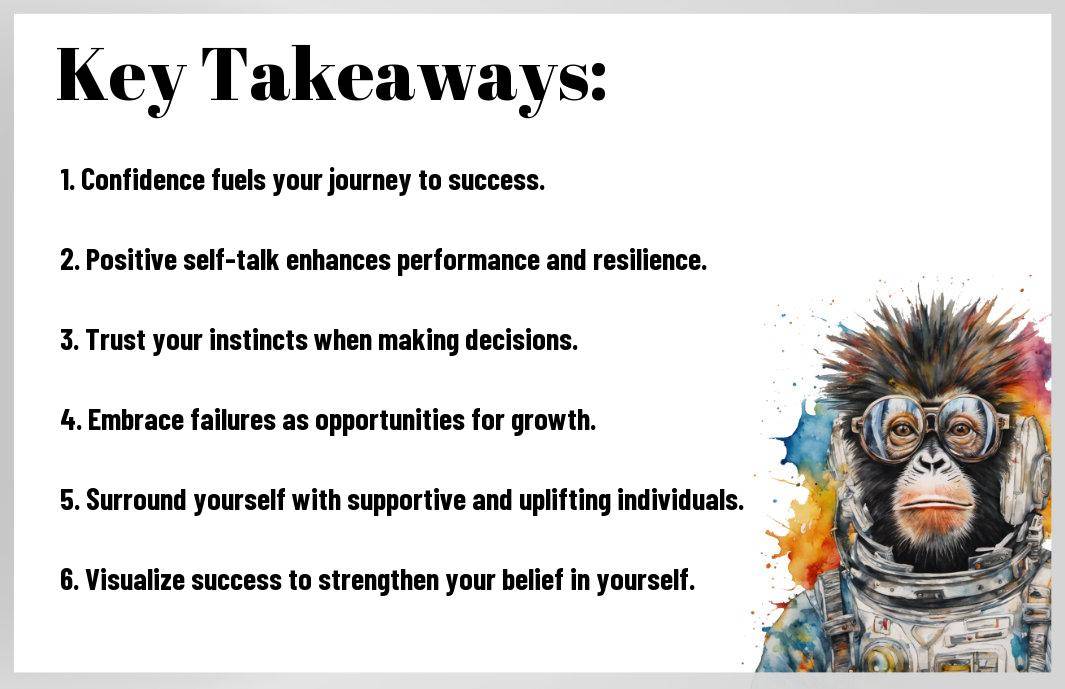
Newsletter Subscribe
Enter your email address below and subscribe to our newsletter

Enter your email address below and subscribe to our newsletter

You hold the key to unlocking your potential through self-belief, a powerful mindset that can transform your life. When you believe in yourself and your abilities, you open doors to opportunities and give yourself the strength to face challenges. It’s imperative to cultivate this mindset, as it not only leads to personal growth but also enhances your resilience in times of adversity. By exploring resources like Believe in Yourself: Why It’s Important and How to Do It, you can learn practical ways to boost your confidence and embrace your unique journey.

While self-belief serves as the foundation for personal and professional growth, it empowers you to navigate challenges with confidence. When you truly believe in your abilities, you become more resilient in the face of setbacks, allowing you to pursue goals with determination. Self-belief enhances your decision-making skills, enabling you to take calculated risks that can lead to greater opportunities. Ultimately, trusting in yourself creates a positive feedback loop, fostering a mindset that attracts success and fulfillment.
Around you, the effects of self-belief radiate positivity, enhancing your motivation and productivity. When you trust your capabilities, you are more likely to take on new challenges and step outside your comfort zone. This self-assurance leads to improved mental health, as you develop a stronger sense of purpose and direction in life. Moreover, believing in yourself helps cultivate healthier relationships, as you project confidence that inspires others to do the same.
Believing in yourself is the antidote to self-doubt, allowing you to confront and diminish its impact on your life. As you navigate life’s complexities, self-doubt can insidiously creep in, creating barriers that stifle your potential. However, by cultivating a practice of self-belief, you can gradually dismantle these barriers, enabling you to embrace your strengths and capabilities.
Considering the pervasive nature of self-doubt, it’s crucial to acknowledge its presence while actively working to transform it. To overcome self-doubt, I focus on challenging negative thoughts by replacing them with affirmations that highlight my strengths and achievements. It’s important to seek support from friends and mentors, as their encouragement can help reinforce my self-belief. Embracing failure as a learning opportunity rather than a setback also plays a significant role in diminishing self-doubt and building resilience.

Any journey toward self-belief begins with recognizing your unique strengths and allowing yourself to embrace them. I’ve found that self-discovery plays a significant role in building confidence. As you identify and celebrate your abilities, you create a solid foundation of self-belief, becoming more resilient against doubts and setbacks.
The path to enhancing your self-belief involves implementing effective strategies. I recommend setting small, achievable goals that push you slightly outside your comfort zone. Celebrating each success, no matter how small, fosters a sense of accomplishment that bolsters your overall confidence.
To solidify your self-belief, incorporating positive affirmations into your daily routine can be immensely helpful. Affirmations are powerful statements that encourage a positive mindset, allowing you to challenge negative thoughts and beliefs about yourself.
At their core, positive affirmations help rewire your brain, replacing self-doubt with empowering beliefs. By consistently repeating affirmations that resonate with you, such as “I am capable” or “I believe in my abilities,” you reinforce your self-image and manifest a more confident version of yourself. This practice can be transformative, nurturing a strong sense of self-worth and encouraging you to take bold steps towards your goals.

To foster a growth mindset, I must consciously embrace the process of learning and development. This involves shifting my perspective to view challenges as opportunities for growth rather than obstacles. By adopting this mindset, I can unlock my potential, enhance my skills, and cultivate resilience in the face of adversity.
An vital part of cultivating a growth mindset involves embracing challenges and viewing failures as stepping stones to success. I understand that each setback provides valuable lessons that can enhance my skills and fuel my ambition. By tackling challenges head-on, I foster resilience and a willingness to grow.
On my path to self-improvement, I view criticism as a tool for growth rather than a personal attack. Engaging with constructive feedback allows me to identify areas where I can develop and improve my abilities. By acknowledging this feedback, I open myself up to new perspectives that enrich my understanding of both myself and the tasks at hand.
In addition, it’s important to separate my self-worth from external opinions. When I receive criticism, I focus on the insights it provides, rather than allowing myself to be discouraged. This mindset creates a framework whereby I can filter out unhelpful comments from those that truly resonate. By taking constructive criticism to heart, I elevate my performance and enhance my skills, ultimately driving me closer to my goals.
Your environment plays a significant role in shaping your self-belief. Surrounding yourself with motivating elements can reinforce your confidence, while toxic surroundings can hinder your progress. The energy and attitudes of those around you can either lift you higher or pull you down. Taking an active role in curating your environment can lead to greater self-empowerment and improved mental resilience.
Among the most effective ways to foster self-belief is by surrounding myself with supportive and encouraging individuals. These people can uplift you during challenging times, provide valuable advice, and celebrate your successes. When I engage with positivity, it naturally influences my mindset and strengthens my resolve to pursue my goals.
With every positive influence, we must also acknowledge and minimize the negative ones. Supportive individuals can help drown out the voice of self-doubt that sometimes creeps in through toxic relationships or discouraging environments. Identifying and distancing myself from these influences empowers me to reclaim my self-belief. I find it crucial to curate my social circle by surrounding myself with people who inspire and motivate rather than drain my energy or enthusiasm.
Despite the challenges I face, I have discovered that putting self-belief into action creates a powerful momentum. By taking small yet consistent steps towards my goals, I not only build confidence in my abilities but also develop resilience. I’ve learned that believing in myself means pushing through doubt and embracing opportunities, turning aspirations into reality.
Around me, I see people who set ambitious goals but often falter in their pursuit. I find that breaking my objectives down into smaller, manageable tasks helps maintain my focus and energy. By doing this, I can assess my progress continuously and make adjustments as necessary, ultimately leading to successful outcomes.
An effective strategy I use to maintain self-belief is celebrating small wins. Acknowledging these minor achievements helps reinforce a positive mindset and keeps me motivated to push forward.
In addition to propelling me forward, celebrating small wins is a fundamental practice that nurtures my self-belief. Each accomplishment, no matter how minor, represents progress and signifies that I am moving closer to my bigger goals. I take the time to reflect on these victories, whether it’s completing a challenging task or learning a new skill. This practice minimizes feelings of overwhelm and promotes a sense of fulfillment, reminding me of my overall abilities and potential.
For sustained self-belief, I find it crucial to engage in consistent practice of self-affirmation and positive visualization. Exploring resources like Building Strong Self-Belief: 16 Tips & Activities can immensely help you reinforce your self-confidence and evaluate your goals effectively.
Across my journey, I’ve discovered that regular self-reflection allows me to assess my progress, celebrate my achievements, and identify areas for improvement. By dedicating time to analyze my thoughts and actions, I strengthen my self-belief and grow more adaptable to challenges.
By embracing change, I remain flexible and open to new opportunities. The ability to adapt enhances my resilience and fortifies my self-belief amid uncertainty.
Hence, navigating through life’s transformations can be daunting, yet I’ve found that staying proactive in challenging situations is empowering. When faced with a shift, I remind myself that embracing change often leads to personal development and new possibilities. Providing myself with the space to grow is vital, as it allows me to recognize that change is a part of life, and by adapting, I enhance my self-efficacy and confidence in my abilities.
Considering all points, I firmly believe that developing self-belief is integral to achieving personal and professional success. By trusting in your abilities, you empower yourself to take risks and pursue your goals with confidence. Each challenge becomes an opportunity for growth, and I see that by fostering a positive self-image, you can overcome obstacles and inspire those around you. Ultimately, the journey to self-belief starts within, and as you cultivate this mindset, you’ll unlock your true potential and achieve remarkable things.
A: Self-belief refers to the confidence and trust that you have in your own abilities, qualities, and judgment. It is the understanding that you are capable of achieving your goals and overcoming challenges. This inner conviction can lead to greater resilience and motivation in pursuing your dreams.
A: Self-belief is important because it influences your actions and decisions. When you have confidence in yourself, you are more likely to take risks, initiate change, and embrace opportunities. A strong sense of self-belief can also enhance your mental well-being and result in improved performance in various aspects of life, such as work, relationships, and personal growth.
A: Cultivating self-belief involves several strategies, such as setting realistic goals, celebrating small achievements, surrounding yourself with supportive individuals, and practicing positive self-talk. Regularly reflecting on your strengths and past successes can also help reinforce your belief in yourself. Engaging in activities that challenge you but are achievable can further build confidence over time.
A: Self-belief plays a significant role in overcoming challenges by providing the motivation and determination needed to face difficulties head-on. When you believe in your capabilities, you are more likely to persist through setbacks and seek solutions rather than feeling defeated. A positive mindset can be a powerful tool for navigating obstacles and achieving desired outcomes.
A: Yes, self-belief can be influenced by external factors such as the opinions of others, societal expectations, and past experiences. Negative feedback or criticism can undermine your confidence, while encouragement and positive reinforcement from friends, family, or mentors can foster self-belief. Being aware of these influences can help you develop a more resilient self-image.
A: Self-belief can significantly impact relationships, as a confident person tends to have healthier interactions with others. When you believe in yourself, you are less likely to seek validation from others, leading to more authentic connections. Additionally, self-belief can enhance communication skills and the ability to set boundaries, resulting in more balanced and respectful relationships.
A: Yes, it is completely normal to experience fluctuations in self-belief throughout your life. Various factors, such as stress, failure, or life transitions, can contribute to moments of self-doubt. It’s important to acknowledge these feelings and take proactive steps to rebuild your confidence. Seeking support from others, practicing self-compassion, and using techniques to challenge negative thoughts can help reinforce your self-belief during challenging times.